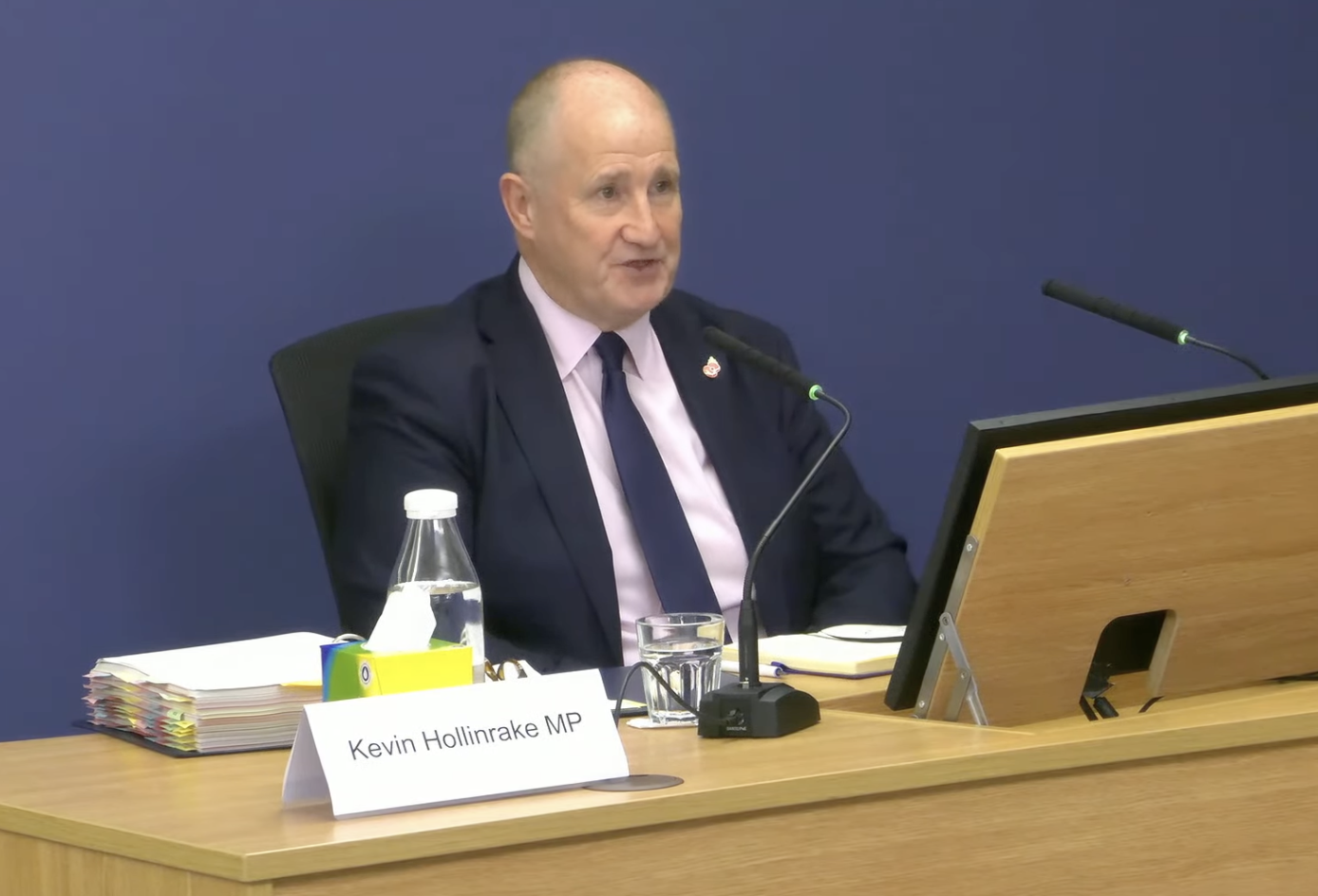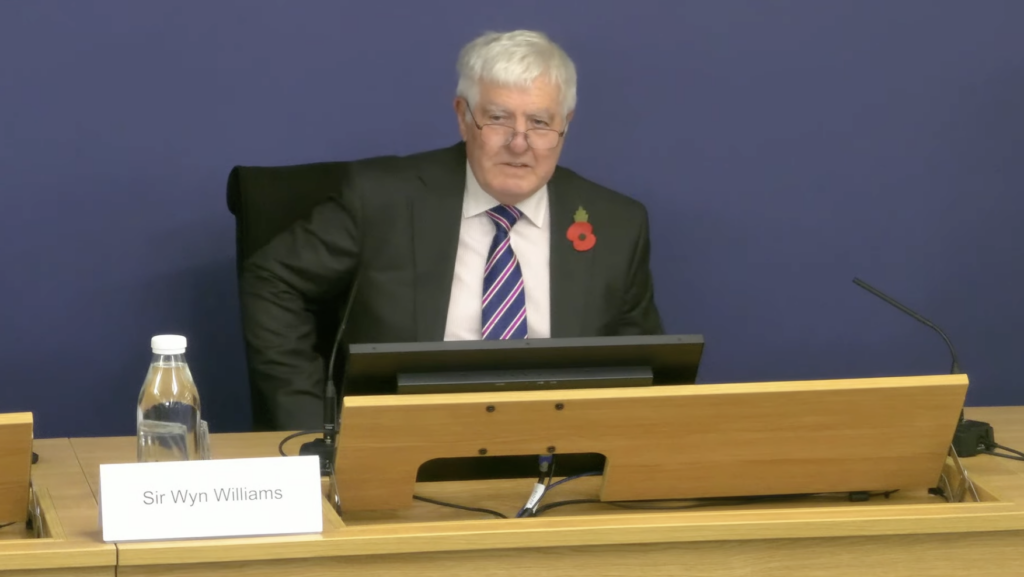
The day began with a tolling of the metaphorical bell. Before the former Post Office minister Kevin Hollinrake gave evidence, the chair of the Post Office Inquiry, Sir Wyn Williams, told us that another former Subpostmaster has died, again without receiving full and final compensation. Her name was Carol Riddell. She was the Subpostmaster at East Bolden, near Sunderland, between 1992 and 2000. Sir Wyn told the Inquiry: “During her time as sub-postmistress, Mrs Riddell had to contend with a very serious armed robbery at her post office, during the course of which she was blinded by having acid thrown in her face.”
When Horizon was rolled out, Sir Wyn told us Mrs Riddell found using new technology “particularly difficult”. She handed the reins to her husband, Alan, who ran the branch with Carol’s assistance until 2013. Due to problems with their accounts, the couple had to pay significant sums to the Post Office, causing them severe financial hardship. In her witness statement to the Inquiry Carol recalls an interview concerning inexplicable Horizon losses, which had led to her husband being suspended. The interview took place with a Post Office goon called Andy Carpenter, who Mrs Riddell called “very threatening”, something she found “quite frightening”. Carpenter had initially refused to let Mrs Riddell’s CWU union representative attend the meeting. “Fortunately,” wrote Mrs Riddell “the representative was very experienced and insisted he be present.”
With no evidence of wrongdoing and robust representation, the Post Office “reluctantly lifted” her husband’s suspension. “I was promised a recording of the interview,” wrote Mrs Riddell “but when I requested it, conveniently, I
was told that the machine had malfunctioned and had not recorded the interview. I felt victimised by the Post Office and exposed by their threats and intimidation.”
It is well worth reading both Alan and Carol’s witness statements, and this ITV News report on their situation. It gives you some measure of the way they were treated and the effect it had on their livelihoods and health. They were part of the historic Bates v Post Office group litigation (GLO) which concluded in their favour five years ago next month.
Number One Priority
Today the former Postal Office minister agreed the failure to deliver proper compensation to the Riddells was “simply wrong”. Yet Hollinrake was the man in charge of setting up the compensation scheme for GLO claimants and “leading the Government’s action on redress”. He writes in his witness statement that doing this was his “number one priority as Minister, no question about it”.
Sir Wyn asked to know if Hollinrake was so concerned with getting compensation to victims quickly, why did the Post Office and the government chose to concoct compensation schemes which involved “arming themselves with lawyers and arguing it out”. Sir Wyn addressed Hollinrake directly: “They didn’t have to have a room full of lawyers to argue this out. That was… your choice. Your collective choice, you understand. So, why?”
Hollinrake started by avoiding the question, saying: “I don’t think we should do that in the future. I think we should have some independence set in the middle of it, and something that we certainly…”
Sir Wyn cut in to tell Hollinrake he wasn’t asking about the future, he was asking about his tenure: “You become the relevant minister in 2022… the GLO scheme had hardly begun. So why not then say ‘right, we’ll have a completely different attitude in the Post Office and the Department: we won’t arm our defence with lawyers, we’ll have a reasonable [qualified person] who will just look at these claims and make a fair assessment’?”

Hollinrake replied:
“If I had my time again, that’s exactly… it’s one of the mistakes I made, yeah it was very early on in my time as Minister that the GLO scheme came down the track. It was only two or three months after I think, and I met with various different people including people like Kevan Jones, Lord Arbuthnot and others, who all seemed to be quite happy with the scheme was established. Now, looking back now, I don’t think I should have been happy with that. There were scheme reviewers. Sir Ross Cranston was brought in as a scheme reviewer for the GLO. I think what I should have insisted on, at that point in time, was for Sir Ross to play a greater role right at the start rather than be the backstop for disputes. I probably hoped, which is probably a vain hope, that that process could happen more quickly, but it’s too far down the line. So I hold my hands up. I say sorry to people whose claims have not been settled quickly enough through that process. It’s something I got wrong. I’m sorry that’s the case.”
On the issue of whether the lawyers or anyone else was deliberately trying to throw a spanner in the compensation works in order to delay payments, Hollinrake was adamant “I’ve never experienced anybody in government or the civil service who tried to hinder compensation to any individual.“
So what was slowing it down? “It’s a result,” Hollinrake told the Inquiry, “of a complex process…. if you’re going to go there, you wouldn’t start from here in terms of how we’ve done this.”
Is that it? Not quite.
“I think there were some failures within Post Office, some of these failures which have been well publicised for the inquiry, but also in individual cases [which] took too long and were flawed and mistakes were made. So there are logistical problems and some of that has to be described as incompetence as well as failure for other reasons. But I don’t think I ever met anybody who didn’t want to compensate Postmasters as quickly as possible.”
Towards the end of his evidence, Mr Hollinrake stated: “perception is reality”. For all everyone’s supposed best intentions, the reality is we are nearly five years down the line and people are dying before receiving their due. There’s something very wrong with a system which can destroy innocent lives, cover it up and then (when caught out) fail to compensate its victims in a fair and timely manner. Especially when the will to do so is allegedly there.
I don’t buy it. The government can make things happen very quickly when it wants or needs to. The lack of urgency in providing compensation for Subpostmasters is hinderance, but as no one is incentivised to move at a reasonable speed, nothing moves at a reasonable speed. Blaming “the process” is a cop out, and nowhere near an acceptable excuse.
UPDATE: On seeing this post, Kevin Hollinrake wrote on twitter:
“Surprised that you’re telling only half a story Nick. As you know, what I was explaining were some of the things that still needed improving, but many improvements have already been made, which is why we’ve seen redress rising exponentially from c£120m 12 months ago to £438m today. This will continue to rise due to the Fixed Sum Awards on the HSS/GLO/OC schemes and the 700 convictions quashed by Parliament.”
The journalism on this blog is crowdfunded. If you would like to join the “secret email” newsletter, please consider making a one-off donation. The money is used to keep the contents of this website free. You will receive irregular, but informative email updates about the Post Office Horizon IT scandal.

Leave a Reply